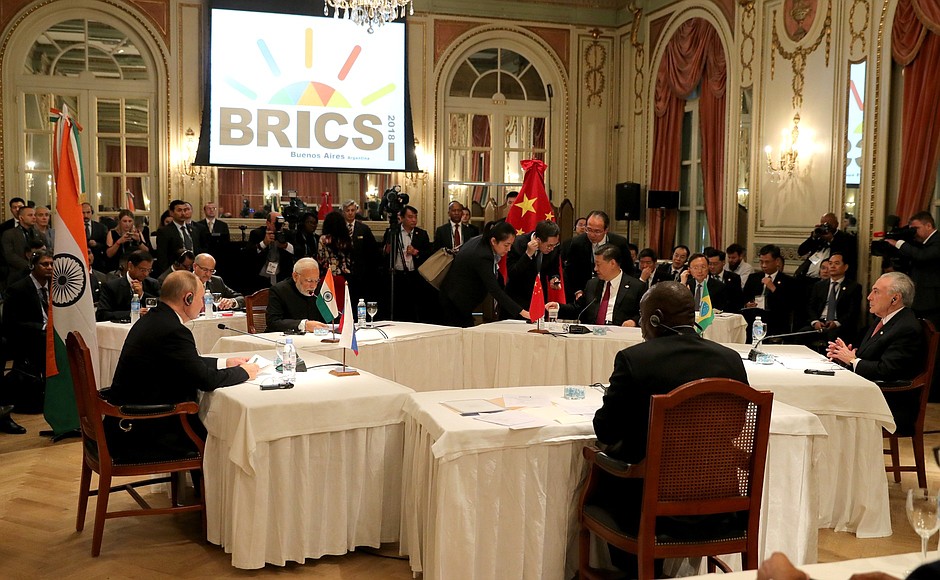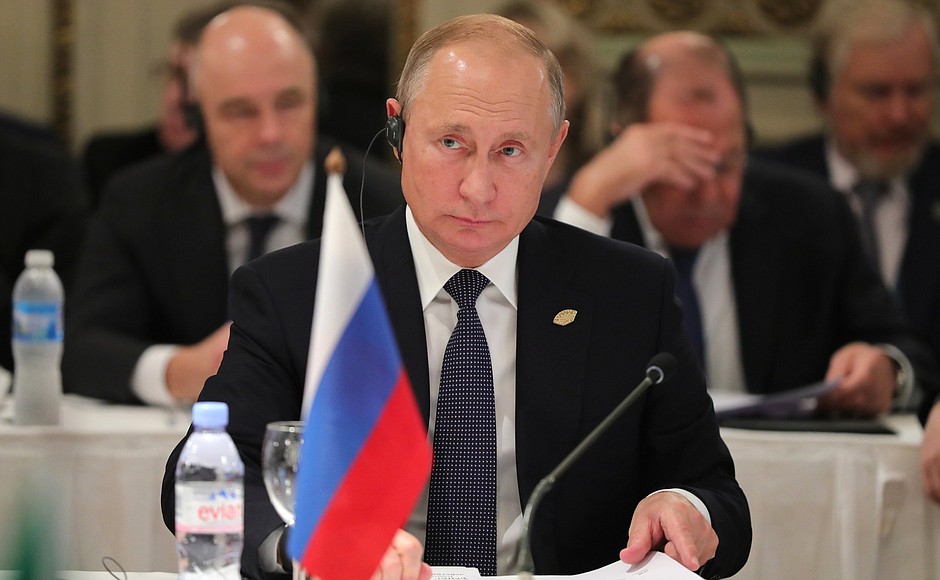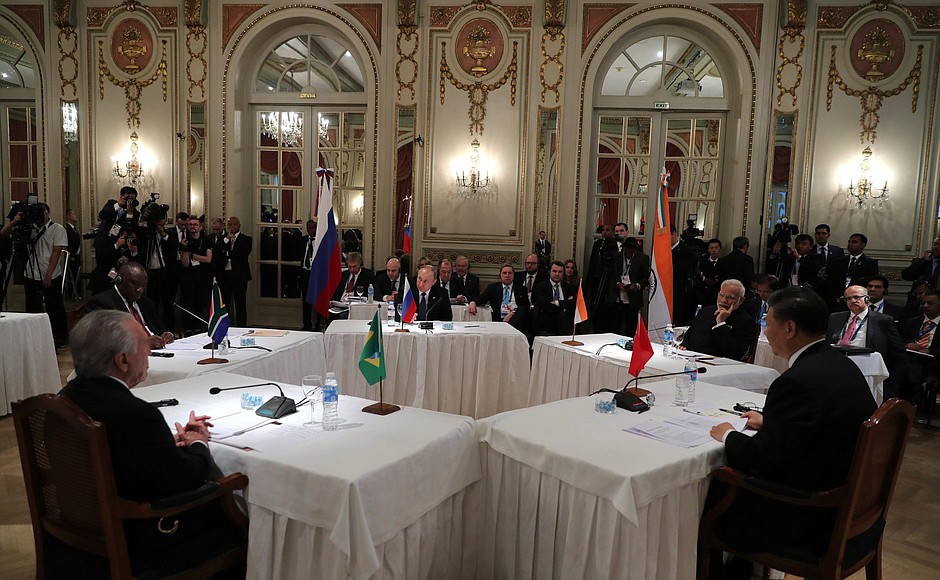Vladimir Putin took part in a meeting of leaders of the BRICS member countries held on the sidelines of the G20 summit in Argentina.
* * *
President of Russia Vladimir Putin: Friends, colleagues,
I am pleased that we are meeting again and, like my colleagues, I express my gratitude to the President of South Africa, Mr Ramaphosa, for organising our work and for everything South Africa has done during its chairmanship.
I would like to join in the gratitude addressed to President of Brazil Michel Temer. He supported our organisation, and I can add that he also has done a lot to strengthen Russian-Brazilian relations. We know and remember that. Mr President, we will always be glad to see you in Russia.
See also
Thanks to efficient cooperation between the BRICS members, our strategic partnership has grown stronger and continues to actively develop in the most diverse areas.
It is important that the BRICS members are improving coordination within international organisations and forums. Our meeting today, which is a chance to discuss our positions on the eve of the G20 summit, is a testament to that.
I support much of what my colleagues have said about the difficult situation in global politics, economy, trade and finance. I would also note such risk factors as an increase in global debt, volatility of stock markets and escalating trade disputes.
In general, we cannot help noticing that unfair competition often takes the place of fair and equitable intergovernmental dialogue. The nefarious practice of imposing unilateral sanctions and protectionist measures without regard to the UN Charter, WTO rules and other generally accepted legal norms is spreading.
All of this seriously undermines the atmosphere of cooperation on the global stage and leads to declining business ties and loss of trust between participants of economic relations, distorting the very fabric of the global economy.
The BRICS countries should continue to work together to create a fair and equitable system of international relations. Collective action based on mutual respect and consideration of interests is needed in order to overcome the critical challenges facing the international community.
First of all, this concerns the settlement of numerous regional crises, which are fraught with real danger not only for the countries involved, but for the rest of the world as well. Of particular concern is the situation in the Middle East, namely, the Gaza Strip, Yemen, Iraq, Libya, Afghanistan and several other countries and regions.

Unfortunately, the danger posed by international terrorism is not subsiding. Of course, double standards or any compromises are unacceptable when it comes to terrorist groups, not to mention making reckless use of them to achieve geopolitical ends, since flirting with terrorists plays into their hands and emboldens them to commit new bloody atrocities.
Thus, in Syria, where militants continue armed attacks on the government forces, the November 24 attack on residents of the western districts of the city of Aleppo involving the use of toxic chemical agents, presumably chlorine, was a blatant violation of the ceasefire. Dozens of Syrians were affected, including children. Such crimes perpetrated by terrorists should not go unpunished, otherwise they will not stop.
For a long-term stabilisation of the situation in Syria, it is important to promote an actual political settlement process. To this end, Russia is working closely with its partners, Iran and Turkey, within the Astana format. We look forward to the formation and convocation of the constitutional committee in Geneva as soon as possible.
Other priorities include rebuilding the economy and infrastructure in that country and creating conditions for the return of refugees to their homes. I hope that the BRICS countries will join humanitarian aid programmes in that country.
In order to prevent a new round of escalating tensions around the Iranian nuclear programme, we should do our best to maintain the Joint Comprehensive Plan of Action.
Progress in resolving the Korean Peninsula crisis is a positive development. However, the categorical demands for unilateral concessions from Pyongyang could lead to a disruption of the agreements reached. Therefore, it is important that the sanctions against this country should gradually be relieved in response to the disarmament steps taken by North Korea.
Naturally, one cannot help being alarmed by the state of affairs in non-proliferation and disarmament. The possible withdrawal by the United States of its obligations under the INF Treaty and its unclear position on extending the Strategic Arms Treaty pose the risk of an uncontrolled arms race.

We presume that the BRICS countries will hold a common position on these critical issues. This will be an important factor in mobilising the efforts of the world community for the sake of international security and stability.
Colleagues,
I would like to note with satisfaction that the BRICS countries have largely coinciding approaches to the key issues on the G20 agenda. Our countries have great economic, innovative, and human potential.
The BRICS countries have already overtaken the G7 in terms of aggregate GDP ($44 trillion) and in purchasing power parity. They can play a more significant role in the global financial system, push for the continuation of the IMF reform and for greater influence in the IMF.
A significant contribution to financial stability has been made by the new development bank, which is now supporting 26 projects in BRICS countries with $6.5 billion in financing. We also expect the bond and national currencies fund of the BRICS countries to become available in 2019, which would allow strengthening financial and investment stability and expanding the interaction of national payment systems.
We are committed to supporting the groundwork for the process of further developing the World Trade Organisation to stabilise it. It is important that trade disputes are settled exclusively through dialogue that all interested countries can join.
We pay special attention to coordinating the BRICS countries’ positions on issues related to energy and climate change. Russia, as a reliable exporter of energy to many countries and regions in the world, intends to continue to actively participate in harmonising global energy markets jointly with other suppliers and consumers of fuel and to provide global energy security.

We welcome the fact that the Paris Agreement on climate has come into effect and believe it to be a reliable international legal instrument for long-term climate regulation. It is critically important to finish drafting the rules to implement it, taking into consideration the views of all stakeholders.
We regard the sustainable development of agriculture as a key topic on the G20 agenda. Russia is a large producer and exporter of agricultural produce, contributing significantly to food security. Over the last 10 years, we supplied over 650,000 tonnes of food and humanitarian aid to more than 110 countries.
We believe it is important that this year agreements on the digital economy and adaptation of the labour market and education systems have been reached within the G20. We express our gratitude to our BRICS partners for supporting the Russian idea of consumer rights’ protection in the digital economy and our initiatives to step up coordinated actions at the UN on internet governance and international information security.
The agenda also includes the important topic of combatting corruption. We are ready to work together, including in line with India’s proposal to pursue fugitive economic criminals. During discussions at the UN, I am counting on the support of BRICS members for the Russian draft international convention on returning stolen assets.
Colleagues, in conclusion I would like to wish success to our Brazilian partners next year, during their chairmanship of BRICS. We will provide all the necessary assistance.
Thank you for your attention.